Will Syria fall apart? The likelihood of the creation of the “Alawite State
How modern Syria was created
The lands of modern Syria for exactly four centuries, from 1517 to 1918, were part of the Ottoman Empire. After the defeat of the Ottoman Empire in the First World War, most of its land was occupied by the Entente powers, or declared independence. An important role in Arab politics before and after the First World War was played by Great Britain, which contributed to the intensification of anti-Ottoman sentiment among the population of the Arabian Peninsula. The British established friendly relations with the Saudi dynasty, which ruled in Nejd (the “core” of the future Saudi Arabia) and preached Salafism. However, the sacred for all Muslim cities of Mecca and Medina, located in the province of Hijaz, were under the control of the sheriffs of Mecca, which was ruled by the Hashimite Arab dynasty from 1201. Sheriffs retained power over the holy city and after the entry of the Hejaz into the Ottoman Empire. During World War I, the British managed to push Sheriff Mecca Hussein Ibn Ali to an anti-Ottoman protest. He was promised official recognition as the king of the independent Hejaz. In June, 1916, Mr. Hussein ibn Ali, raised a revolt against Ottoman rule, hoping thereafter to unite all Arabs of the Arabian Peninsula under his rule. Hejaz acted on the side of Great Britain, so when, in 1918, British troops commanded by Edmund Henry Allenby entered Syria and 30 September occupied Damascus, along with them came the Arab forces under the command of Faisal, the son of Meccan sheriff and King Hejaz Hussein ibn Ali . Faisal held the post of Minister of the Interior in Hejaz. The king of Hijaz hoped that with the help of Great Britain he would succeed in uniting all Arab lands under his rule - from Syria in the north to Yemen in the south. Therefore, his son Faisal began to form the Arab government in Damascus. In October, 1918 was appointed Ali Reid Bash al-Rikabi (1864-1942), a native of Damascus, a former Turkish general, who opposed the entry of the Ottoman Empire into the war on the German side and paid for it with a military career.
Before the entry into Damascus of the troops of Faisal al-Ricabi, he served as mayor of the city. However, the British were not going to give the Middle East lands under the control of the Hejaz Hashemites. Prince Faisal was allowed to rule only the eastern part of Syria, since, in accordance with the Sykes-Pico agreements, Palestine was reserved for British control, and Lebanon and Western Syria - for French control. Already on October 8, 1918, French troops landed in Beirut, which replaced British garrisons in Syria. The French military administration ceased the activities of the Arab authorities. Thus, the hopes of the Hejaz dynasty to establish their power over the entire Arab Middle East did not come true, although Hussein ibn Ali and Faisal continued to count on a possible revenge. France demanded full implementation of the Sykes-Picot agreements, in connection with which Great Britain withdrew its troops from Damascus. Prince Faisal's attempts to find understanding with the ruling circles in Britain and France were unsuccessful. French General Henri Gouraud was appointed High Commissioner for Syria and Cilicia (southeast coast of Turkey). However, the Syrian population did not welcome the French presence in the country. Meanwhile, Faisal's father Hussein ibn Ali was unsuccessfully waging a war with Nejd, which was ruled by the Saudis. On the Arabian Peninsula, there was a struggle for power, in which the Saudi dynasty that ruled Nejd, the Hashemite dynasty that ruled the Hejaz and the Rashidid dynasty that ruled the emirate of Jebel Shammar took part. While his father was at war in the Arabian Peninsula, his son Faisal did not give up hope of confirmation as the monarch of Syria. In March 1920, the Syrian National Congress was convened in Damascus, which proclaimed the political independence of Syria in its historical borders, including British-occupied Palestine. At the same congress, Faisal was proclaimed king. Ali Rida al-Rikabi May 9, 1920 was appointed Prime Minister of Syria. Al-Rikabi's government introduced universal conscription in Syria and set about creating and strengthening its own armed forces. Naturally, the events that took place provoked a sharply negative reaction in Paris, which by that time had received a mandate to govern Syria and Lebanon. In addition, the Christians of Lebanon were also dissatisfied, who feared discrimination and pogroms if the lands they inhabited became part of the Syrian Arab kingdom. In Baabda, the Council of Christian Leaders was assembled, which on March 22, 1920, proclaimed the political independence of Lebanon. On July 14, 1920, the French high commissioner in Syria, General Henri Gouraud, presented an ultimatum to King Faisal, putting before the latter two possible alternatives - abdication of the royal throne in Syria or cooperation with the French authorities and following their instructions. Faisal, seeking to maintain his power in Syria, decided to cooperate with the French military administration. It is likely that he would have retained the royal title and received part of the rights to govern Syria, but Syrian Defense Minister Yusuf al-Azma refused to submit to the French command. A quick Franco-Syrian war began. In the battle of Maysalun, the Syrian army was defeated, suffering huge losses. Minister of War al-Azma also died. Already on July 24, 1920, the troops of General Goybet entered Damascus.
Syria under the French mandate. Country section
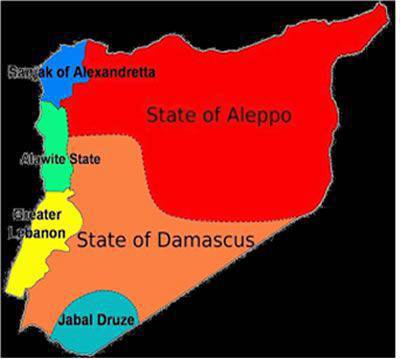 In an effort to protect Syria from further uprisings, the French leadership decided to create several political entities in Syria. Thus, the State of Damascus, the State of Aleppo, the Alawite State, Jabal ad-Druz (Druze Land), Sandjak Alexandretta, and the State of Great Lebanon appeared. This division is not complete, but it takes into account the ethno-confessional differences that existed from time immemorial in Syria. The fact is that in the confessional sense Syria has never been a single state. First, one of the largest Christian communities in the Arab world historically lived here. Christianity and now profess about 10% of the Syrian population, first of all - Assyrians, Armenians, Greeks, Arabs-Christians. Historically, most Syrian Christians were concentrated in the northern part of the country, which in 1920 became part of the State of Aleppo. In the city of Aleppo, there was a huge Christian community, which constituted one third of the urban population and was the largest in the Middle East, besides the community of Lebanese Christians. At the same time, the Christians of Aleppo were not united - they included adherents of various churches, among which the followers of the Armenian and Syrian Orthodox churches were the most numerous. The significant Jewish community lived in Aleppo, the number of which before mass emigration to Israel was at least 10 thousand people. But the majority of the population of Aleppo were Sunni Muslims, although there were Shiite and Alawite villages in the region. The southern and less economically developed part of Syria became part of the State of Damascus, the center of which was the city of Damascus itself. It was dominated by the Arab Sunni population. In the north of Syria, on the Syrian-Turkish border, Sandjak Alexandretta was singled out in 1921, in which, in addition to Arabs and Armenians, lived a large Turkish population. In 1936, instead of Sanjak Alexandretta, the State of Hatay was formed, which was annexed by Turkey in 1939.
In an effort to protect Syria from further uprisings, the French leadership decided to create several political entities in Syria. Thus, the State of Damascus, the State of Aleppo, the Alawite State, Jabal ad-Druz (Druze Land), Sandjak Alexandretta, and the State of Great Lebanon appeared. This division is not complete, but it takes into account the ethno-confessional differences that existed from time immemorial in Syria. The fact is that in the confessional sense Syria has never been a single state. First, one of the largest Christian communities in the Arab world historically lived here. Christianity and now profess about 10% of the Syrian population, first of all - Assyrians, Armenians, Greeks, Arabs-Christians. Historically, most Syrian Christians were concentrated in the northern part of the country, which in 1920 became part of the State of Aleppo. In the city of Aleppo, there was a huge Christian community, which constituted one third of the urban population and was the largest in the Middle East, besides the community of Lebanese Christians. At the same time, the Christians of Aleppo were not united - they included adherents of various churches, among which the followers of the Armenian and Syrian Orthodox churches were the most numerous. The significant Jewish community lived in Aleppo, the number of which before mass emigration to Israel was at least 10 thousand people. But the majority of the population of Aleppo were Sunni Muslims, although there were Shiite and Alawite villages in the region. The southern and less economically developed part of Syria became part of the State of Damascus, the center of which was the city of Damascus itself. It was dominated by the Arab Sunni population. In the north of Syria, on the Syrian-Turkish border, Sandjak Alexandretta was singled out in 1921, in which, in addition to Arabs and Armenians, lived a large Turkish population. In 1936, instead of Sanjak Alexandretta, the State of Hatay was formed, which was annexed by Turkey in 1939. In the south-east of Syria, to safeguard the interests of the ethnic and religious commonality of the Druze, the state of Jabal ad-Druz was singled out. Druzes are a very isolated group of the population in the territory of modern Lebanon, Syria, Jordan and Israel, speaking Arabic, but having significant cultural differences from the surrounding Arabs, caused by the Druze belonging to a particular branch of Islam. Back in the Middle Ages, the Druze broke away from the Shiite sect of the Ismailis, forming in the XI century. His own teaching, which was based on the views of the preacher Mohammed bin Ismail Nashtakin al-Darazi, by whose name they received their name. As in a number of other Middle Eastern religious sects, the transition of Druze to another religion is impossible, as is the adoption of Druse religion by representatives of other ethnic communities. Druze must be born from father and mother - Druze and profess the religion of the Druze. In the Ottoman Empire, the Druze retained a certain autonomy, which included the almost complete power of the Druze nobility over the bulk of the ordinary Druze, the right to unlimited wearing. weapons, the absence of military service. At the same time, the Druze were never completely loyal to the Ottomans, moreover, they repeatedly made anti-Turkish speeches. Historically, the Druze community had developed ties with Great Britain, which patronized this ethno-confessional community, hoping to find in them guides of its influence in the Middle East. Currently, there are at least one and a half million Druze in the world, about 900 thousands of them lived in Syria before the start of the war. Another state formation created in the territory of Syria occupied by the French was the Great Lebanon. The isolation of Lebanon from the Syrian lands was dictated by the desire of France to protect the interests of the Maronite community - Lebanese Maronite Christians, who had long-standing historical ties with Paris. Maronites did not want to live in the Muslim state and dreamed of creating their own public education. Actually, Lebanon was originally created as a state of Arab Christians. But by decision of the French authorities, the lands inhabited by Muslims, Sunnis and Shiites, were included in Greater Lebanon. The great Lebanon existed until 1926, when the constitution was adopted and the Republic of Lebanon was established, in which the president should be a Christian, the prime minister - a Sunni Muslim, and the speaker of parliament - a Shiite Muslim.
Finally, it was during the years of the French rule of Syria that the State of Alawites was created, which included a relatively small territory in the north-west of the country, on the Mediterranean coast. Back in 1919, during the “parade of sovereignties” after the collapse of the Ottoman Empire, the Alawite state with its capital in the port of Lattakia proclaimed its political independence. However, 2 September 1920, France received the mandate to manage the Alawite territory from the League of Nations. However, the Alawites continued to resist, and only in October 1921 their leader Salih Al-Ali decided to surrender, after which, 1 July 1922, the Alawite Region was incorporated into the French mandated Syria.
Alawites - a unique community in Syria
Alawites are followers of Alavism, one of the trends in Shiite Islam, which “balances” on the verge of an independent religion, since it includes elements of Christian dogma. Until now, discussions on the origin of the Alawites have not stopped in the scientific community, and their dogma has not been thoroughly studied, because, like the Druze, the Alawites are a very closed community, preferring not to spread about their teaching. There are versions about the origin of the Alawite Syria and Turkey’s close Alevites from Syrians, Greeks and Armenians who were forced to convert to Islam (more precisely, to create the appearance of adopting Islam) after Ottoman rule was established. It is possible that the descendants of the European Crusaders, who created several states here in the Middle Ages, could take part in the ethnogenesis of the Alawites of Syria.
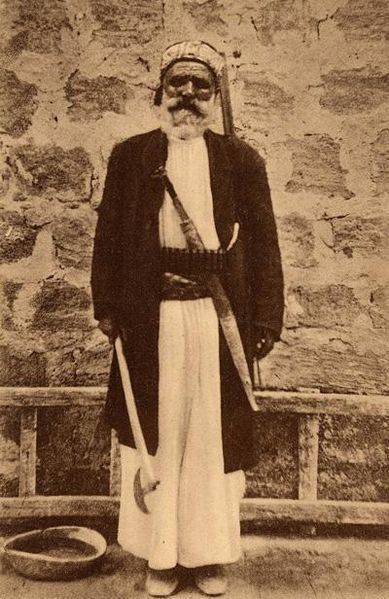
The history of the Alawites goes back centuries. Many opponents and critics of the Alawites believe that the Iraqi theologian Muhammad ibn Nusayr, who lived in the 9th century AD, was at the origins of this creed. and preaching the divinity of the eleventh Shiite imam Hassan al-Askari. Ibn Nusayr called himself “Bab” - “Gateway”, the messenger of Hassan al-Askari. The teachings of the Alawites are poorly understood, since the Alawites themselves prefer not to disseminate information about their religious views, and information about this religious movement has to be obtained from representatives of other ethno-confessional communities, which may not always be objective. According to some scholars, the Alawite teaching is based on faith in Ali as the embodiment of Sense, Muhammad as the embodiment of the Name and Salman al-Farsi (the first non-Arab who converted to Islam) as the embodiment of the "Gate". The Alawites also revered the daughter of the prophet Muhammad and the spouse Ali Fatima. Knowing God is impossible, but he can appear in the image of man. The history of mankind, according to the Alawite teaching, knew the seven prophets - Adam, Nuh (Noah), Jacob (Jacob), Musa (Moses), Suleiman (Solomon), Isa (Jesus) and Muhammad. However, they were all incarnations of Ali as incarnations of God. The Syrian Alawites are characterized by the veneration of Isa - Jesus, and a number of Christian saints are also worshiped along with him. Alavites celebrate Christmas and Easter, can carry Christian names, receive communion with wine. According to Alawite mythology, people were created before the creation of the Earth and were lights and planets, not knowing sin and obedience. Ali was the Sun, which appeared to people in different guises. After Ali created the Earth, he embodied people in a corporeal shell, created demons and shaitans. According to the Alawite teaching, human souls can migrate after death in animals. After a sevenfold incarnation, human souls fall either into the starry sphere or into the sphere of demons. Some religious scholars believe that the Alawites are characterized by a very disdainful attitude towards women, who are not ordained in the subtleties of teaching and are not even allowed to worship.
The highest levels in the Alawite hierarchy are occupied by the members of the family of the Prophet Muhammad, who, in the opinion of the believers, possess intimate knowledge. They separate the elect and the uninitiated. The chosen ones - “Khassa” - are the children of the father and mother - the Alawites, who were dedicated at 18 years of age through taking an oath and communion with wine. Ordinary Alawites are called "Amma" and do not carry the innermost knowledge available only to initiates. Alawites, like other Muslims, build mosques, but practically do not attend them. External aspects of religiosity for the Alawites are of the minimum importance. In particular, they perform namaz not five, but twice a day, and they may not even commit it at all. In Ramadan, the Alawites do not fast for a month, but only for a fortnight. In addition, the Alawites do not have a ban on the use of alcoholic beverages inherent to other Muslims. Moreover, the use of wine is ritual in Alawite. It is known that the Alawites are distinguished by extreme tolerance, and, if necessary, they can impersonate other religions - faith allows them to use this tactic (it is obvious that it was thanks to this behavior that the Alawites kept their faith and were able to survive in a hostile environment). However, on the part of the Muslims, especially the Sunnis, the Alawites are met with extremely hostile attitudes. Many Sunnis do not recognize the Alawite as a Muslim. Relations with the Shiites, on the contrary, are very friendly, especially after the middle 1970-s. Currently, Iran is the main strategic ally of the Syrian Alawites.
From the "social bottom" to the heights of power
It is known that already in the XVI century the Alawites gained a fairly strong position in several areas of the Levant, which even forced the Ottoman authorities to recognize the two ruling Alawite clans - the sheikhs Beni Hamadi and the emirs Harfush. At the same time, Istanbul made every effort to play on the contradictions of the Alawites, Druze and Ismailis, who periodically clashed with each other. During the Russian-Turkish war of 1768-1774. Alavite Sheikh Nasif Nassar sided with the Russian fleet. Recall that the Russian squadron of Admiral A.G. Orlova was sent to the Mediterranean Sea to block Turkish ships in the region. This was far from the only example of disloyalty of the Alawites of Ottoman Turkey. So, during Napoleon Bonaparte’s campaign in Egypt, the Alawites again opposed the Turks - this time on the side of the French army. However, after the defeat of the French troops, Turkish-Egyptian rulers unleashed their anger on the Alawite leaders. The massacre of the Alawites led to the destruction of many prominent Alawite sheikhs, and also deprived the Alawites of most of the territories they previously controlled. Only the mountainous territory in the Latakia region remained under the control of the Alavites. Since then, outside Latakia and Tartus, the Alawites have remained a marginal minority that occupied the lower floors of the social hierarchy of Syrian society. Their position was comparable to that of the Yezidis in Iraq or Turkey. If in the vicinity of Latakia the Alawites were engaged in traditional agriculture, then in other parts of Syria they had no choice but to take on unskilled and hard work. Laborers, janitors and cleaners, domestic workers in many cities in Syria were recruited from unemployed Alawites who migrated in search of employment from the territories of their compact residence. Since Sunni Muslims treated the Alawites with neglect and considered them heretics, in the Ottoman Empire the Alawites were doomed to a marginal social position and, moreover, were threatened with possible pogroms. The situation began to change rapidly after the end of the First World War, when the Ottoman Empire collapsed, and the Syrian lands fell under French control. Suddenly, representatives of all Syrian ethno-confessional groups of the population were in an equal position in front of the French military administration. At the same time, the Sunni Arabs, who constituted the majority of the population of Syria, maintained the hope of gaining independence from France and often raised anti-French uprisings. They were extremely reluctant to go to colonial service, unlike the Alawites and Christians. Syrian Christians, who had previously gravitated to intellectual and commercial activity, formed the basis of the Syrian Europeanized intelligentsia and the bourgeoisie, many of them then finally moved to Europe and Latin America.
As for the Alawites, military service remained for them the only channel of social mobility - the Alawites were disciplined people, but differed from Christians by a low level of education, being mainly peasants or artisans. In turn, the French military administration saw in the Alawites an excellent personnel resource for replenishing the personnel of the colonial troops stationed in Syria and Lebanon. Long-held grievances against the Sunni Arabs contributed to the fact that the Alawites gladly entered the service in the colonial troops. So, gradually, the Alawites began to penetrate the military elite of the Syrian society - many capable soldiers were trained in the only military school in the country and received officer ranks. The Syrian Legion was formed to carry guard service in Syria and suppress the rebellions that periodically flared up by the French, later renamed the Levant Special Forces. The personnel of the Levant Special Forces were recruited from representatives of national and religious minorities - Armenians, Druze, Circassians and Alawites. In this case, the Circassians recruited mainly in the cavalry, and the Alawites formed the basis of the colonial infantry. By the beginning of World War II, the Levant Special Forces, which consisted of 10-12 thousands of soldiers, sergeants and officers, included 10 infantry battalions, 4 cavalry squadrons, 3 companies of mecharists (camel cavalry), auxiliary and engineering units. These forces were stationed in Syria, and 9 Lebanese Jaeger companies and 22 cavalry squadrons, staffed by Circassians, Kurds and Druze, were deployed in Lebanon. Of the 10 Syrian infantry battalions, the 8 battalions were manned by Alawite recruited in villages in the mountains of Shara. In general, the Alawites constituted up to 80% of the personnel of the Levant Special Forces.
27 September 1941 France granted independence to Syria, but French troops remained in the country until 1946. The traditions of military service remained among the Alawites even after the proclamation of Syria’s political independence. Since the officers of the colonial troops, who formed the backbone of the commanding staff of the army of independent Syria, almost all came from various national minorities of the country, the political development of Syria was different from the neighboring Arab states. Sunni Arabs almost from the first years of the existence of the Syrian sovereign statehood were forced to compete for power with people from ethnic and religious minorities who had influence in the Syrian army. If Sunni Arabs were active in conservative and religious-fundamentalist organizations, the Alawites willingly joined the ranks of secular nationalist parties, including BAAS, the Arab Socialist Renaissance Party, created in 1947 by Orthodox Christian Michel Aflyak, the Sunni Arab Salah ad-Din al-Bitar and Alawiti Zaki al-Arsuzi. In Syria, the Alawites prevailed in the ranks of the Ba'ath Party, as well as in military service. It should be noted that the majority of Alawites who occupied leading positions in the party and army belonged to the Amma group, that is, the “uninitiated Alawites”, and therefore rather represented the Alawites not as a religious movement, but as a social group of the once deprived and oppressed people of Syria who managed to break out of the marginal position and become the true rulers of independent Syria.
Post-war Syria before 1970 was shaken by periodic coups and displacements of one ruler by another.
 On November 13, 1970, 45 years ago, another military coup took place in Syria, which, as it turned out, was destined to change the political face of the Syrian state. At the head of the country stood the forty-year-old Hafez al-Assad. He was born on March 6, 1930 in the village of Kardakh, in the vicinity of Latakia, in an Alavite family and was the eighth child in the family of a simple peasant Suleiman al-Assad. When Syria gained independence, Hafez was 16 years old. Soon he entered the flight department of one of the military schools in Syria, and then - at the National Air Force Academy. The young officer joined the Baath Party and was soon able to occupy significant positions in it. By the way, when he was a captain of the Air Force, he did an internship in the USSR - on the territory of Kyrgyzstan. Gradually, Assad was able to actually take control of the “army” wing of the Ba'ath Party. He led a large number of Alawites to the party, increasing his authority in the Alavite environment through marriage to the representative of the noble Alavite family Anise Makhlyuf. In 1963, Hafez al-Assad was awarded the rank of Brigadier General aviation, after which he became commander of the Syrian Air Force and Air Defense. In 1966, a thirty-six-year-old general was appointed Minister of Defense of Syria. Having come to power, Hafez al-Assad made significant efforts to legitimize the Alawites in the Muslim world. Thanks to Assad’s position and its influence on Lebanese Shiites, the leader of the latter, Imam Musa al-Sadr, issued a fatwa back in 1973 recognizing the Alawites as one of the trends in Shiism. After the Islamic Revolution in Iran, Tehran became one of Syria’s most reliable allies, along with Moscow. For many decades, the Tehran-Damascus bloc opposed in the Middle East the influence of the "oil" monarchies of the Persian Gulf, focused on supporting Sunni Arabs. Naturally, in Syria itself, the presence of the Alawite minority in power always caused discontent from other ethnic groups, especially Sunni Arabs, who make up at least 70-75% of the Syrian population, but never, since the advent of the Baath Party and, especially, Asad clan, to power in the country, did not have real political capabilities. Despite the fact that Hafez al-Assad, trying to secure his positions, strongly emphasized the equality of representatives of all faiths, and even General Syaf Mustafa Tlas, a Muslim Sunni, was appointed the Minister of Defense of Syria, in reality the most combat-ready army units, as well as special services, were mainly staffed by Alawites. Therefore, even the appointment of Sunnis to higher posts in the army and government did not satisfy the Arab-Sunni majority of the Syrian population.
On November 13, 1970, 45 years ago, another military coup took place in Syria, which, as it turned out, was destined to change the political face of the Syrian state. At the head of the country stood the forty-year-old Hafez al-Assad. He was born on March 6, 1930 in the village of Kardakh, in the vicinity of Latakia, in an Alavite family and was the eighth child in the family of a simple peasant Suleiman al-Assad. When Syria gained independence, Hafez was 16 years old. Soon he entered the flight department of one of the military schools in Syria, and then - at the National Air Force Academy. The young officer joined the Baath Party and was soon able to occupy significant positions in it. By the way, when he was a captain of the Air Force, he did an internship in the USSR - on the territory of Kyrgyzstan. Gradually, Assad was able to actually take control of the “army” wing of the Ba'ath Party. He led a large number of Alawites to the party, increasing his authority in the Alavite environment through marriage to the representative of the noble Alavite family Anise Makhlyuf. In 1963, Hafez al-Assad was awarded the rank of Brigadier General aviation, after which he became commander of the Syrian Air Force and Air Defense. In 1966, a thirty-six-year-old general was appointed Minister of Defense of Syria. Having come to power, Hafez al-Assad made significant efforts to legitimize the Alawites in the Muslim world. Thanks to Assad’s position and its influence on Lebanese Shiites, the leader of the latter, Imam Musa al-Sadr, issued a fatwa back in 1973 recognizing the Alawites as one of the trends in Shiism. After the Islamic Revolution in Iran, Tehran became one of Syria’s most reliable allies, along with Moscow. For many decades, the Tehran-Damascus bloc opposed in the Middle East the influence of the "oil" monarchies of the Persian Gulf, focused on supporting Sunni Arabs. Naturally, in Syria itself, the presence of the Alawite minority in power always caused discontent from other ethnic groups, especially Sunni Arabs, who make up at least 70-75% of the Syrian population, but never, since the advent of the Baath Party and, especially, Asad clan, to power in the country, did not have real political capabilities. Despite the fact that Hafez al-Assad, trying to secure his positions, strongly emphasized the equality of representatives of all faiths, and even General Syaf Mustafa Tlas, a Muslim Sunni, was appointed the Minister of Defense of Syria, in reality the most combat-ready army units, as well as special services, were mainly staffed by Alawites. Therefore, even the appointment of Sunnis to higher posts in the army and government did not satisfy the Arab-Sunni majority of the Syrian population. The civil war in Syria and the prospects for the Alawites
Dissatisfaction with the almost half a century of Alawite rule spilled out in 2011, when, in the general context of the Arab Spring, inspired by the monarchies of the Persian Gulf and the West, protests began in Syria against the rule of President Bashar al-Assad. The bulk of the protesters were just Sunni Arabs, whose organizations receive more financial, organizational and military assistance from Saudi Arabia and Qatar. The United States and Western Europe immediately sided with the anti-Assad opposition, trying to put Bashar al-Assad a bloody dictator, suppressing democratic freedoms. Despite the absurdity of the attempts of the American and European media to extradite religious extremists operating in Syria, as "democrats" and "fighters with the bloody regime", even now, after a bloody civil war has been going on for several years, the Western liberal public has not changes its position. At the same time, Western politicians, scholars and journalists diligently avoid the question of what awaits Syria and, in particular, the ethnic and religious minorities of the country in the event of the victory of the Sunni opposition, especially the forces of the Islamic State banned in Russia. Meanwhile, it is obvious that a mortal threat looms over the Christian and Alawite population of Syria. It can be said that in the battles fought by the government troops of Bashar al-Assad with extremists, the question of the fate of Christianity and non-Sunni Islam in this country is being resolved. After all, the IG and similar organizations set as their goal a complete cleansing of the country's territory from all other believers and dissidents. Among the radicals are the slogans "Christians to Lebanon" and "Alawites to the grave". That is, an even more terrible fate was prepared for the Alawites than for the Christian population.

Alawites understand this very well, therefore they overwhelmingly support the government of Bashar al-Assad. It is the Alawites that make up the basis of the most combat-ready units of the Syrian army, fighting against the IS militants and other radical organizations. Fighters of the Islamic Revolutionary Guard Corps from Iran, the Lebanese Hezbollah, Yemeni and Iraqi Shiites, as well as fighters of leftist organizations of Palestinian resistance controlled by Damascus are fighting on the side of Syria. On the side of Assad, the majority of the Alawites, the Ismailis, the Druze, the Christians, the majority of the Shiites of Syria, and even a part of the Syrian Sunni Arabs are currently speaking. That is, in fact, Assad is regarded as the only hope for almost all ethnic and religious minorities in Syria. The active role of Turkey in supporting the “Syrian opposition” of the Sunni Arabs has provided Assad with the support of the Ismailis, the Druze and the Christians, who have enormous historical resentment towards Turkey since the times of the Ottoman Empire. Most of the Syrian Sunnis are opposed to Assad, and this is a very numerous and serious force. Another thing is that the Sunnis of Syria are fragmented into many organizations that are funded and supported by various foreign "sponsors" and often quarrel with each other.
However, even after the Russian military aviation joined in the destruction of the IS in Syria, it is premature to say that Assad will be able to completely suppress the centers of resistance. Therefore, in the future, the scenario and the division of modern Syria along the model of neighboring Iraq — into practically independent state formations formed according to the ethno-confessional principle — are not excluded. On the other hand, neither the IS and other radical groups, nor the United States and the West will ever agree with such a model. Although many analysts say that the creation of an independent Alawite state - “Alavistan” - in the traditional residence of the Alawites, that is, on the Syrian coast of the Mediterranean Sea, with its center in Latakia, can be the way out. The isolation of Alavistan, Kurdistan, and possibly Druze and Shiite territories from modern Syria may be the logical outcome of a bloody civil war. However, the United States is unlikely to agree to create an Alawite state controlled by Assad, which will have access to the sea and maintain friendly relations with Russia and Iran. The American political scientist Benjamin Jensen spoke out quite succinctly about this. According to Jensen, the creation of an independent Alawite state will lead to disastrous consequences in the Middle East. But what does an American scientist consider a disaster? Jensen stresses that on the coast of Syria, there will be "a heavily armed uncontrolled regime that will act on the orders of Iran and guarantee Russia a deep-sea Mediterranean naval base in Tartus." That is, the American researcher openly admits that the United States, while supporting the anti-Assad opposition, is guided not by mythical considerations of “protecting democracy”, but by very specific goals to prevent the strengthening of the positions of Russia and Iran in the region. And it is precisely on the basis of this position that even a small Alawite state on the lands of the original Alawite residence of the United States is not beneficial - let it be better the IS, but not the Alawites who are friends with Russia and Iran. This is the approach. Another very dubious argument cited by an American political analyst is the probability of turning “Alavistan” into a criminalized state and a “paradise for terrorists”. The fact that this “paradise for terrorists” was created precisely on lands controlled by the anti-Assad opposition is a US researcher who prefers to remain silent. Finally, the creation of an Alawite state, according to Jensen, can become a “bad example” for other countries and peoples of the Middle East, first of all for Kurds of Syria, Iraq and Turkey, as well as for Turkish Alevis very confessional to Syrian Alawites. . For some reason, the American author believes that the Alawites have no right to create their own state, even in a situation that threatens their physical survival. What the Alawites in a hostile environment, ready to physically destroy them, an American who claims to be a political scientist and analyst, does not say. In fact, the position of the United States and a number of their allies means supporting the real genocide carried out by radical fundamentalists, referred to in the West as the “Syrian opposition,” against the Christian, Alawite and Shiite people of Syria.
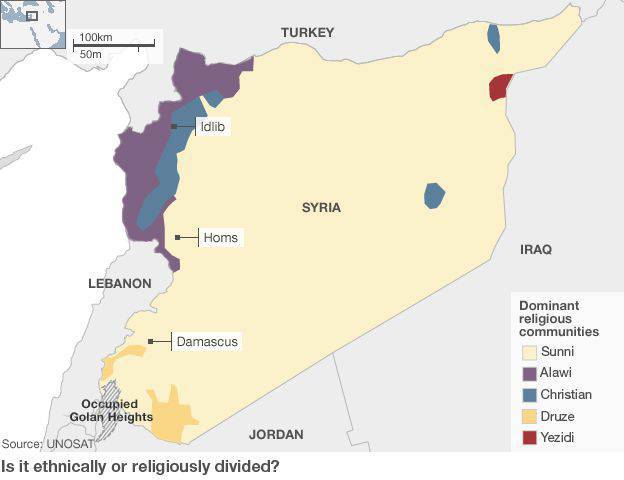
If the Alawite state appears on a part of Syria, it can develop along the lines of Israel - relying on the support of other, more powerful countries (in this case Russia and Iran) and acting as an outpost against religious extremism in the Middle East. And, most likely, the Alawite state will also include Ismailis, partly Druze and all Syrian Christians - from Armenian Catholics and Greek Catholics to Orthodox Arabs and Assyrians. However, the option of creating an independent state of Alawites is an extreme option that allows Assad to retain power over a part of Syria and protect ethno-confessional minorities from the threat of destruction, but giving the majority of the country populated by Sunni Arabs at the mercy of radical organizations. Naturally, the latter in this situation will not stop the armed struggle, therefore, the Alawite state will have to actually constantly conduct military operations, in parallel with the formation of its own economy, which is a very difficult task. On the other hand, many experts doubt not only the feasibility, but also the possibility of creating an Alawite state, citing the large ethnic mixing of the Syrian population, including in the traditional Alawite regions of the country. Finally, it should be noted that the United States and the European Union, as well as the "oil" monarchies of the Persian Gulf will not abandon the use of any methods to further attack the Russian positions in the Middle East, so it is possible that in the case of the creation of the state of Alawites, provocations against it continue.
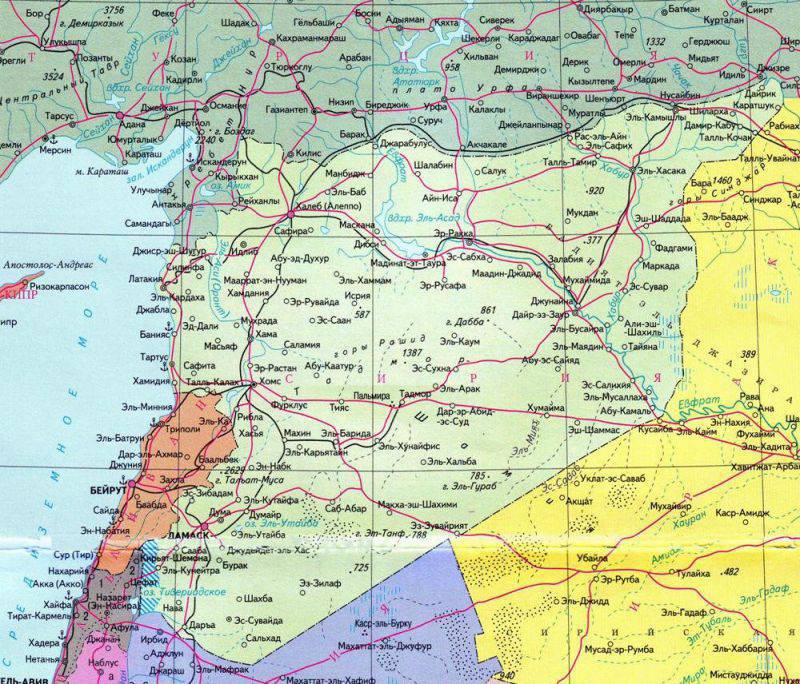
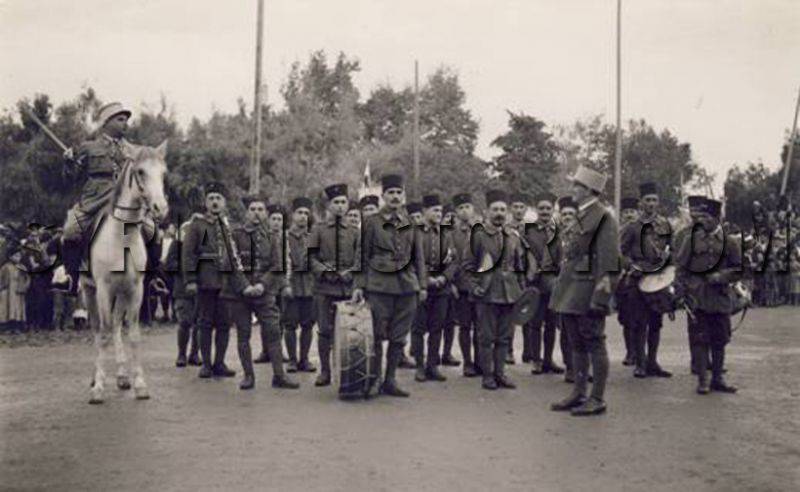
Information